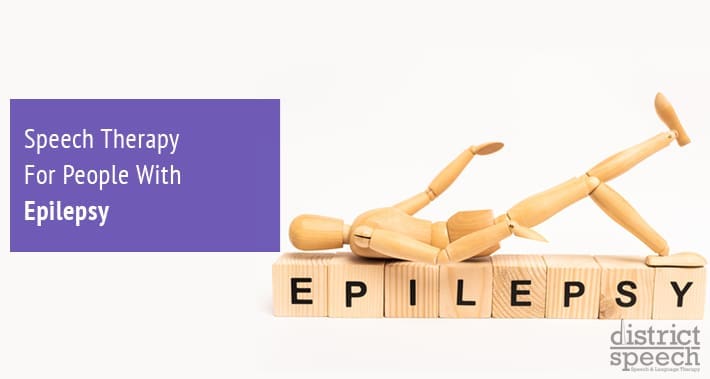
If you or your child have epilepsy, you probably know that it can affect the development of speech or your ability to speak.
Epilepsy isn’t uncommon, either.
The World Health Organization estimates that epilepsy affects 50 million people globally.
It affects both children and adults, which is why both speech therapy for kids and speech therapy for adults can treat it.
Read on to learn more about epilepsy and how a Washington DC speech therapist can help you or your child.
What Is Epilepsy?
Epilepsy is a neurological condition that causes abnormal electrical activity in your brain, which results in seizures.
There are two kinds of seizures you might experience if you have epilepsy.
Generalized seizures are seizures that affect your whole brain.
Focal seizures affect one part of your brain instead of the entire thing.
Seizures can be challenging to recognize if they’re small because they only last a short time and you might even remain awake while they occur.
Strong seizures can last from a few seconds to a few minutes and cause uncontrollable muscle twitches, confusion, or loss of consciousness.
Strong seizures are easier to identify because they’re more obvious.
When you have two or more seizures that don’t have an identifiable cause, your doctor will likely diagnose you with epilepsy.
What Causes Epilepsy?
If you have epilepsy, there is about a 50% chance that doctors will not know what the cause is.
However, there are many factors that can cause the development of seizures.
These factors are mostly a history of previous health issues, including:
- Traumatic brain injury
- A serious illness or very high fever
- A stroke
- A brain tumor or cyst
- HIV, AIDS, or meningitis
- A genetic or developmental disorder
- An illness, injury, or accident that caused lack of oxygen to the brain
There are also genetic links for epilepsy, so if you have epilepsy, it is possible your child will also have it.
If you have generalized epilepsy, the chances of your child also developing epilepsy are higher than if you have focal epilepsy.
What Is A Seizure?
A seizure happens when there is a sudden rush of abnormal electrical signals in your brain.
There are two types of seizures: focal seizures and generalized seizures.
Focal Seizures
Focal seizures only affect one area of your brain.
If you experience focal seizures, you may experience either aware or unaware seizures.
Focal aware seizures include things like changes to your sense of taste, smell, sight, touch, or hearing, dizziness, or tingling and twitching in your limbs.
Focal unaware seizures involve loss of awareness and can include staring blankly, unresponsiveness, or performing repetitive motions.
Generalized Seizures
Generalized seizures affect your whole brain and there are a few different subtypes.
Absence seizures happen when you have a short loss of awareness, usually characterized by a blank stare and repetitive movements like blinking or smacking your lips.
Tonic seizures cause sudden stiffness in your arms, legs, or body.
Atonic seizures are the opposite of tonic seizures, and cause a sudden loss of muscle control that may make you fall suddenly.
Clonic seizures cause repeated, jerky movements in your face, neck, and arms.
Myoclonic seizures cause quick twitching in your arms and legs.
Tonic clonic seizures cause stiffening of your body, shaking, loss of control of you bladder or bowels, biting your tongue, or losing consciousness.
Whether your seizures are generalized or focal, you may not remember having one once it’s finished.
How To Help Someone Having A Seizure
Even small seizures can look scary, but there are a few important things to keep in mind when you’re around someone who’s having a seizure.
Most importantly, you can’t stop a seizure once it’s started.
If you’re with someone who’s having a mild seizure, it’s important to stay with them until the seizure ends and they’re awake and aware.
Once they’re aware of themselves and their surroundings, you should help them to a safe place and let them know what happened, since they may not remember.
It’s important that you stay calm and keep other people calm, as well.
Most seizures don’t require immediate medical attention, so once they’re aware you can find out what they usually need following a seizure, even if it’s just help getting home.
If someone’s having a tonic clonic seizure, helping them looks a little bit different than if they were just having a mild seizure.
When someone is having a tonic clonic seizure, the first thing you want to do is ease them to the ground, turn them to the side so they can breathe, and put something soft under their head so they don’t bang it.
Once you’ve done that, it’s also important to check the area for dangerous objects and remove any accessories like glasses or tight clothing like ties.
If the seizure lasts longer than five minutes, call 911.
Regardless of the type of seizure, it’s important to remember to never hold someone down or try to stop their movements or to offer them food or water until they’re fully alert.
At best, this will do nothing to help, and at worst, you could end up making things worse.

How Can Epilepsy Affect Speech In Kids?
If your child experiences epileptic activity in the left hemisphere of the brain, which is the side that controls language, they might have difficulty expressing themselves.
Not every child that has epilepsy will experience difficulties with language, but there are some factors that may increase the risk of language difficulties in your child.
If your child starts experiencing seizures at a young age, they may have more difficulties with language.
The cause and treatment interventions chosen can also affect your child’s language development.
Finally, the length and type of seizures your child experiences can also affect their language development.
Generally, some common problems with speech and language that seizures can cause include:
- Irregular language
- Speech dysfunction
- Difficulties with recognizing spoken language (also known as auditory agnosia)
- Slow development of language
How Can Epilepsy Affect Speech In Adults?
The most common speech problem in adults with epilepsy is difficulty in coming up with words when speaking, which is also called aphasia.
This can be a much more severe problem if your epilepsy was caused by a stroke, brain tumor, or other brain lesion that primarily affected the language areas in your brain.
A 2022 study by Papadopoulou Et Al found that stuttering is more common in people with epilepsy.
Some medications that you take for epilepsy can also cause speech problems.
RELATED: Speech Language Pathologist For Stuttering
How Can Speech Therapy For Epilepsy Help?
Your speech therapist can work with you to reduce the impacts of aphasia and stuttering.
For children with epilepsy, it’s important to start language interventions as soon as your child is diagnosed with epilepsy.
Even if your child is very young, early intervention speech therapy can reduce the impact of speech on your child’s academic abilities and communication skills.
If your child experiences auditory agnosia, their speech therapist may introduce sign language or other AAC options to help them be able to communicate.
Book Your Appointment With District Speech Today
If you or your child experiences language difficulties due to epilepsy, we can help.
Book your appointment with District Speech today.
1300 I St NW, Suite 400 E,
Washington, DC 20005
- https://g.page/districtspeech
District Speech and Language Therapy specializes in speech therapy, physical therapy, and occupational therapy solutions, for both children and adults, in the Washington D.C and the Arlington Virginia areas.